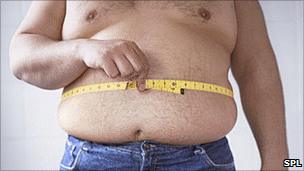NHS 'ill-prepared to deal with obese patients'
- Published

Nearly a quarter of adults are obese
The NHS is poorly prepared to treat obese patients, an analysis of patient safety records suggests.
The Central Manchester University Hospitals NHS Trust team reviewed nearly 400 cases submitted to the National Patient Safety Agency to identify what mistakes were being made.
The researchers highlighted a range of issues, including problems with drug doses, ventilation and surgery.
Better training and more specialist equipment was needed, they added.
Nearly a quarter of adults and one in seven children are now estimated to be clinically obese - someone with a body mass index of 30 or over - with the cost to the health service topping Ā£4bn a year.
But the review of 389 reports from January 2005 to August 2008 to the NPSA's voluntary reporting system suggested the NHS was struggling to cope with their specific needs.
Lack of specialist equipment
The study, published in the Postgraduate Medical Journal, said much of the focus in the NHS has been on preventing obesity rather than dealing with the implications of seeing patients who are obese.
There were a number of serious cases highlighted - including three deaths - involving complications such as heart and ventilation problems.
But the overwhelming number involved less serious issues such as pressure sores and delays and cancellations in treatment.
In 86% of cases it was judged there was no or little harm.
The most common problem highlighted - in more than half of cases - was a lack of specialist equipment, such as heavy-duty wheelchairs, beds and operating tables.
Incorrect drug doses, ventilation problems and staff with inadequate knowledge of how best to care for obese patients were also highlighted.
For patients undergoing surgery, a lack of planning and preparation was a recurring theme which resulted in issues such as patients being listed for day cases when they needed to be kept in hospital overnight because of their weight.
Bodyweight campaigner Kathryn Szrodecki: 'it is very difficult to get good health care'
Dr Chris Booth, one of the author's of the report, said: "Obesity has exploded over the last 15 to 20 years and the NHS has struggled to keep up. Obese patients need specialist equipment and there are physiological and anatomical differences that staff need to be aware of."
Mike Farrar, chief executive of the NHS Confederation, agreed it was an important issue to tackle, but said parts of the health service were investing more in equipment.
"Ambulance trusts have had to invest significant amounts in bariatric ambulances in recent years and hospitals are increasing the number of extra-wide, reinforced beds as the demands of larger patients put greater pressure on the system and its staff."
A Department of Health spokeswoman said unsafe care would "not be tolerated".
"We would encourage the NHS to review these findings and make sure that appropriate procedures and equipment are in place to provide safe care at all times," she added.
- Published22 July 2011
- Published3 February 2011
- Published15 December 2010